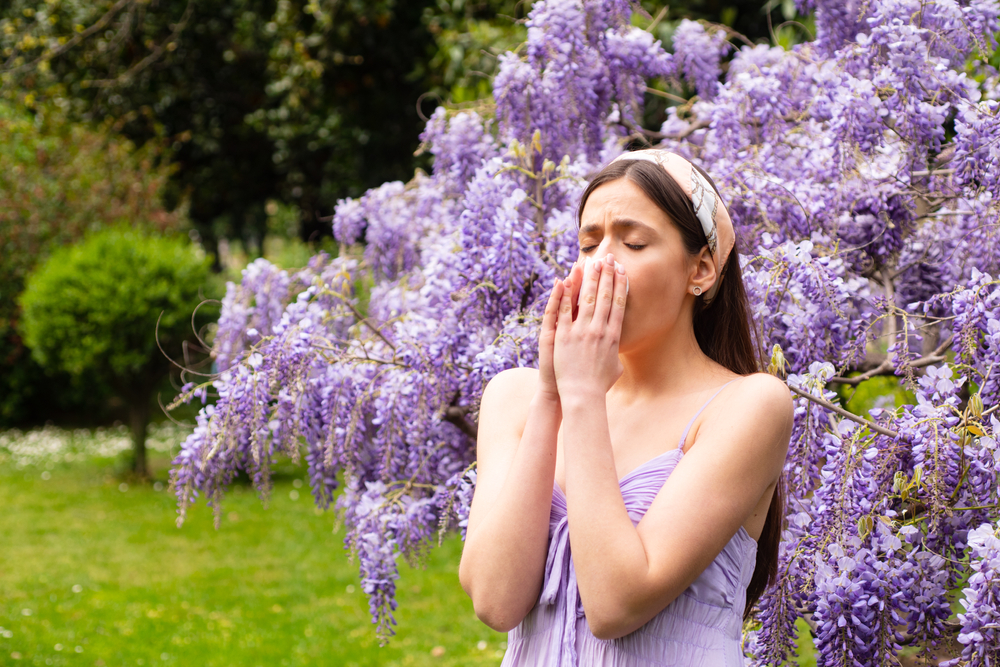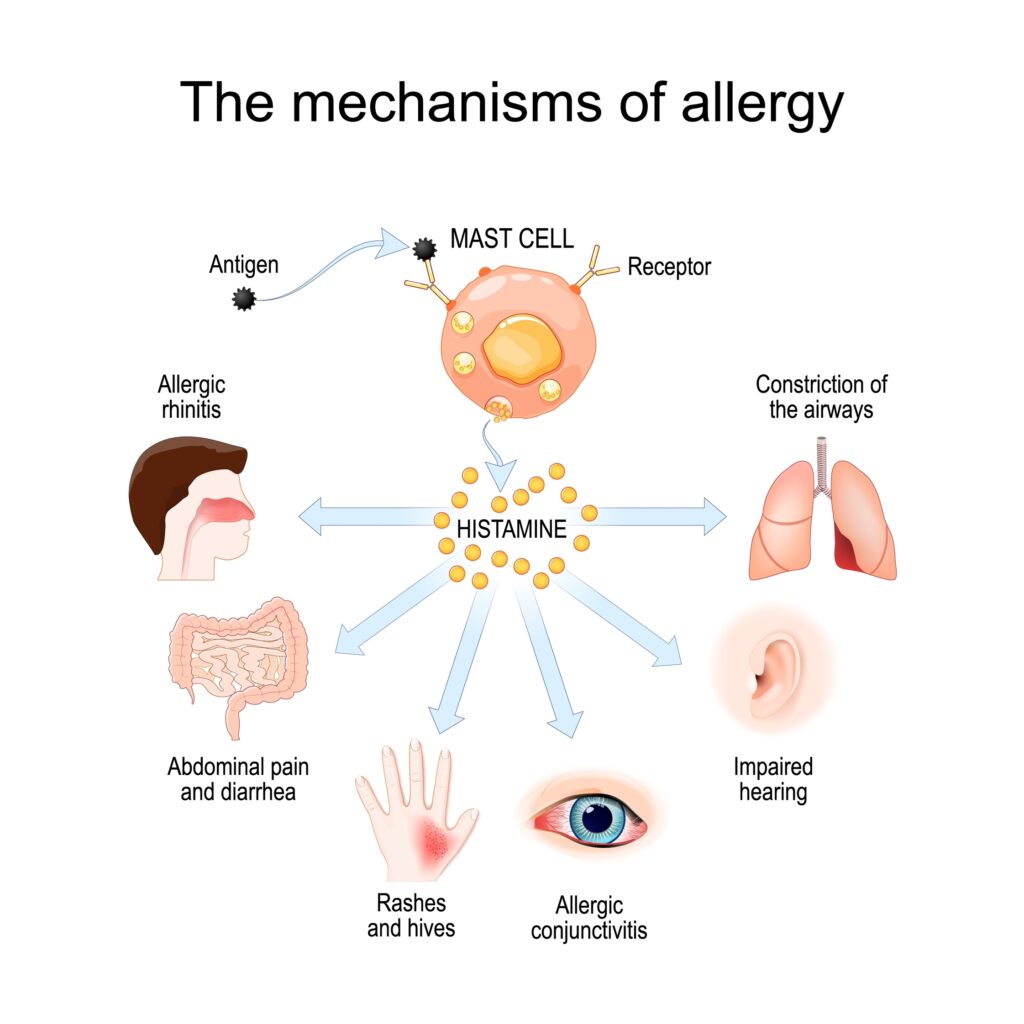
Do your allergy symptoms bloom when the seasons change? You may have allergies during spring, summer, or fall because you’re allergic to things like grass or weed pollen.
However, some people have allergy symptoms throughout the year. When allergies strike, they can affect daily life and leave you drained. Keep reading to learn more about allergies and 5 of the most common seasonal allergy symptoms to watch out for!
What are Allergies?

Allergies occur when your immune system overreacts to a substance usually harmless to most people. The substance is called an allergen. Common allergens include:
- Mold
- Latex
- Pollen
- Dust mites
- Pet dander
- Insects like bees, yellow jackets, and cockroaches
- Some foods like fish, milk, eggs, peanuts, shellfish, and soy
- Certain medications, such as aspirin, ibuprofen, and penicillin
Why Do You Develop Allergies?
Your immune system protects your body against infection and diseases. It prevents germs such as viruses, toxins, bacteria, and fungi from entering your body.
If any of these get through your body’s defenses, your immune system works hard to attack and eliminate the invaders. When you first encounter an allergen you’re sensitive to, your immune system mistakenly identifies it as a threat, much like bacteria or viruses.
It then creates considerable numbers of antibodies called immunoglobulin E (IgE) specific to the allergen it’s trying to fight. These IgE antibodies identify a particular allergen as dangerous, a process called sensitization, but often, you experience no symptoms.
Once the same allergen enters your body in the future, your immune system responds by producing specially designed IgE antibodies to attack and eliminate that allergen.
These antibodies attach themselves to mast cells, which triggers the release of histamine and other chemicals.
Mast cells are in your nose, skin, throat, lungs, and digestive tract. Histamine helps the body eliminate allergens, but it’s also the leading cause of allergy symptoms.
What are Seasonal Allergies?

Seasonal allergies, also called hay fever or allergic rhinitis, happen during specific times of the year, such as summer, fall, or spring. Common allergens that trigger seasonal allergies include mold spores and pollen from grasses, weeds, and trees.
The symptoms of seasonal allergies often come and go around the same time each year.
What are Year-Round Allergies?
You may have year-round allergies if your sneezing or sniffling never seems to give you a break. Perennial or year-round allergies occur when exposed to allergens present all year, such as dust mites, mold, pet dander, and cockroaches.
As a result, the symptoms of year-round allergies are always lurking, no matter the season. Allergies are either perennial (year-round) or seasonal; some may experience both types.
What are the Common Symptoms of Seasonal Allergies?
Whether you have seasonal or year-round allergies, you may experience the following symptoms:
Stuffy Nose
Are you experiencing persistent congestion? You may have seasonal allergies.
Once pollen or mold spores enter your nose, your immune system responds by setting off a chain reaction, including releasing histamine to expel the allergens.
Histamine can cause nasal tissues to swell, narrowing passages. It may also trigger excess mucus production as it tries to flush out allergens. The passage swelling and excess mucus can lead to congestion, making your nose feel stuffy during allergy season.
Itchy, Puffy, and Watery Eyes
When allergens like pollen come into contact with the conjunctiva, histamine is released. The conjunctiva is the transparent, mucous membrane that covers the white of your eye or sclera and the insides of your eyelids.
Histamine causes blood vessels in the conjunctiva to swell, resulting in itchy, puffy, and watery eyes.
Sneezing
Do you often sneeze? Sneezing is one of the most common symptoms associated with allergies.
When you inhale allergens like pollen or mold spores, your immune system recognizes them. It cues the mast cells in your nasal mucous membranes to break open and release histamine to remove the allergens.
Histamine can stimulate nerve endings in your nasal mucous membranes, activating a reflex inside your brain that makes you sneeze.
Runny Nose
Is your nose always runny or dripping? When seasonal allergies flare up, you may constantly go through boxes of tissues.
Allergens like mold and pollen can cause a runny nose and prompt the production of IgE antibodies. When these antibodies bind to mast cells in your nose, they release histamine. Histamine can trigger inflammation in your nasal mucous membranes, causing symptoms such as a runny nose.
Coughing
A nagging cough is a common symptom of seasonal allergies. Once exposed to a substance such as mold or pollen, histamine causes irritation and swelling in your nasal airways, leading to a cough.
Histamine can also increase mucus production. Typically, mucus in your sinuses drains through the nose. But if your nasal airways are swollen and can’t drain mucus, it may trickle down the back of your throat, resulting in post-nasal drip.
Post-nasal drip irritates your vocal cords and throat, giving you a dry cough that may linger.
Allergy Treatment
Allergies can be more than a nuisance. Their troublesome symptoms can cause serious discomfort, affecting your quality of life.
Fortunately, Southern Indiana ENT offers our patients effective, long-term solutions like allergy drops, which treat seasonal and year-round allergies.
Allergy Drops
Also called sublingual immunotherapy, allergy drops are a safe and effective way to treat the root cause of allergies, not just their symptoms. You take allergy drops by placing the solution under your tongue for about one to two minutes before swallowing.
They work by exposing your immune system to gradually increasing doses of an allergen or allergens. The exposure desensitizes your immune system to the substance you’re allergic to, such as pollen or dust mites.
Over time, your immune system builds tolerance to specific allergens, leading to less severe allergic reactions and fewer symptoms when exposed to those allergens. Allergy drops provide long-term relief from pollen, pet dander, mold, and dust mite allergies. The treatment can take three to five years to complete.

Keep Your Allergies at Bay
Whether you have seasonal or year-round allergies, dealing with their symptoms can be challenging. Fortunately, with customized allergy drops from Southern Indiana ENT, you can stop allergies in their tracks and live life to the fullest.
Are seasonal or year-round allergies making you miserable? Schedule your appointment today at Southern Indiana ENT in Columbus, Seymour, Franklin, and Greenwood, IN! Isn’t it time to stop letting allergies run your life?

